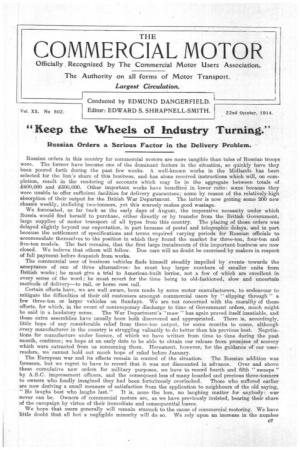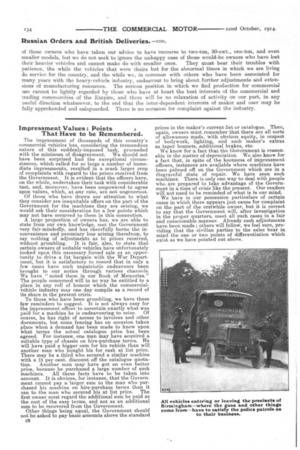"Keep the Wheels of Industry Turning."
Page 1

Page 2

If you've noticed an error in this article please click here to report it so we can fix it.
Russian Orders a Serious Factor in the Delivery Problem.
Russian orders in this country for commercial motors are more tangible than tales of Russian troops were. The former have become one of the dominant factors in the situation, so quickly have they been poured forth during the past few weeks. A well-known works in the Midlands has been selected for the lion's share of this business, and has alone received instructions which will, on completion, result in the rendering of accounts which may lie in the aggregate between totals of £400,000 and £500,000. Other important works have benefited in lower ratio: some because they were unable to offer sufficient facilities for delivery guarantees; some by reason of the relatively-high absorption of their output for the British War Department. The latter is now getting some 200 new chassis weekly, including two-tonners, yet this scarcely makes good wastage.
We forecasted, as far back as the early days of August, the imperative, necessity under which Russia would find, herself to purchase, either directly or by transfer from the British Government, large supplies of motor transport of all types from this country. The placing of those orders was delayed slightly beyond our expectation, in part because of postal and telegraphic delays, and in part because the settlement of specifications and terms required varying periods for Russian officials to accommodate themselves to the position in which they found the market for three-tan, four-ton and five-tan models. The fact remains, that the first large instalments of this important business are now closed. We believe that others will follow. Due care will no doubt be exercised by makers in respect of full payment before despatch from works.
The commercial user of business vehicles finds himself steadily impelled by events towards the acceptance of one of three alternatives: he must buy larger numbers of smaller units from British works; he must give a trial to American-built lorries, not a few of which are excellent in every sense of the word; he must revert for the time being to old-fashioned, slow and uncertain methods of delivery—to rail, or horse cum rail.
Certain efforts have, we are well aware, been made by some motor manufacturers, to endeavour to mitigate the difficulties of their old customers amongst commercial users by " slipping through " a few three-ton or larger vehicles on Sundays. We are. not concerned with the morality of these efforts, for which, in the event of contemporary discharge to time of Government orders, much might be said in a laudatory sense. The Wax Department's "maw" has again proved itself insatiable, and these extra assemblies have usually been both discovered and appropriated. There is, accordingly, little hope of any considerable relief from three-ton output, for some months to come, although every manufacturer in the country is struggling valiantly to do better than his previous best. Negotiations for manufacture under licence, of which we have written from time to time during the past month, continue; we hope at an early date to be able to obtain our release from promises of secrecy which were extracted from us concerning them. Hereanent, however, for the guidance of our user readers, we cannot hold out. much hope of relief before January.
The European war and its effects remain in control of the situation. The Russian addition was foreseen, but we regret to have to record that it was not discounted in advance. Over and above these cumulative new orders for military purposes, we have to record fourth and fifth " sweeps " by A.S.C. impressment officers, and the consequent loss of many hoarded and precious three-tonners to owners who fondly imagined they had been fortuitously overlooked. Those who suffered earlier are now deriving a small measure of satisfaction from the application to neighbours of the old saying, "He laughs best who laughs last." It is, none the less, no laughing matter for anybody: war never can be. Owners of commercial motors are, as we have previously insisted, bearing their share of the campaign by virtue of their immediate and consequential losses.
We hope that users generally will remain staunch to the cause of commercial motoring. We have little doubt that all hut a negligible minority will do so. We rely upon an increase in the number 07
of those owners who have taken our advice to have recourse to two-ton, 30-cwt., one-ton, and even smaller models, but we do not seek to ignore the unhappy case of those would-be owners who have lost their heavier vehicles and cannot make do with smaller ones. They must bear their troubles with patience, the while the vehicles that were theirs but for the abnormal times in which we are living do service for the country, and the while we, in common with others who have been associated for many years with the heavy-vehicle industry, endeavour to bring about further adjustments and extensions of manufacturing resources. The serious position in which we find production for commercial use cannot be lightly regarded by those who have at heart the best interests of the commercial and trading communities of the Empire, and there will be no relaxation of activity on our part, in any useful direction whatsoever, to the end that the inter-dependent interests of maker and user may be fully apprehended and safeguarded. There is no occasion for complaint against the industry.




















